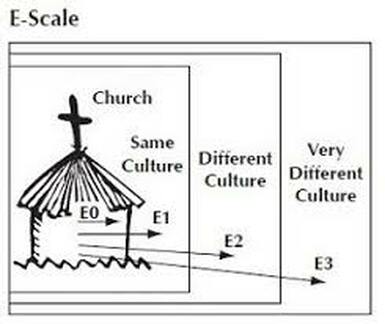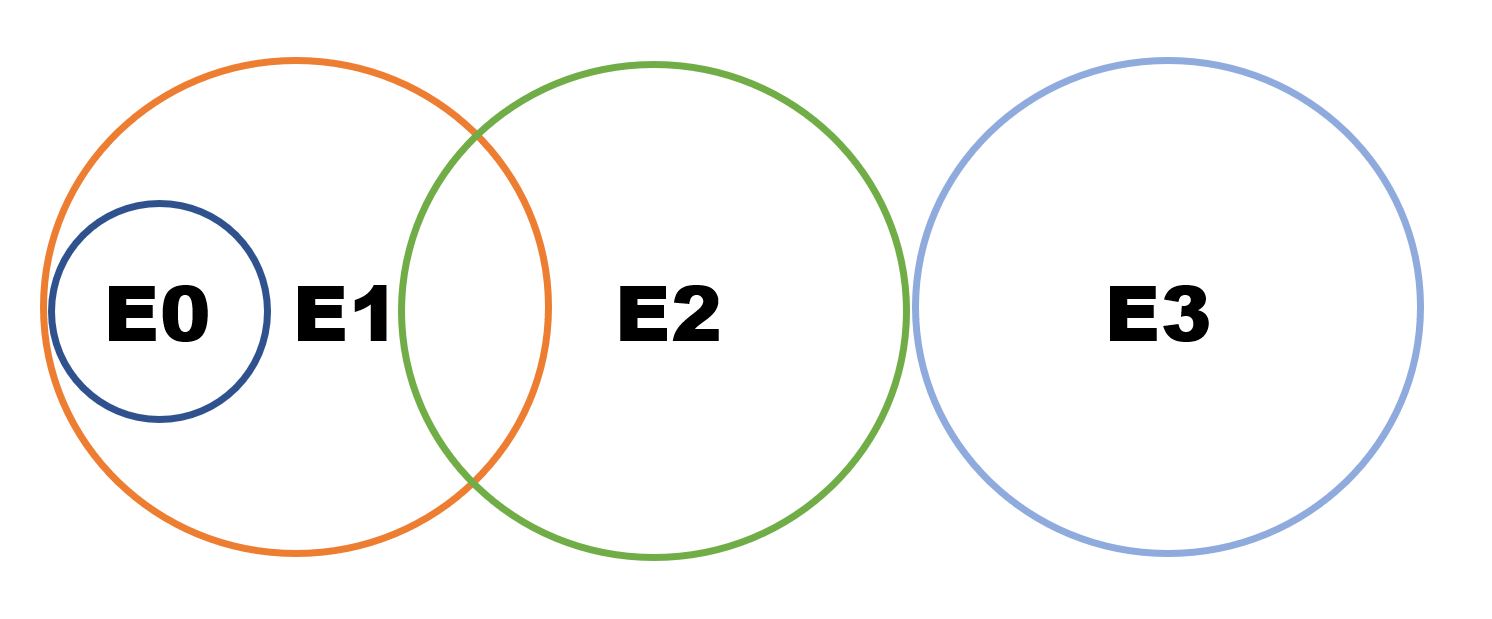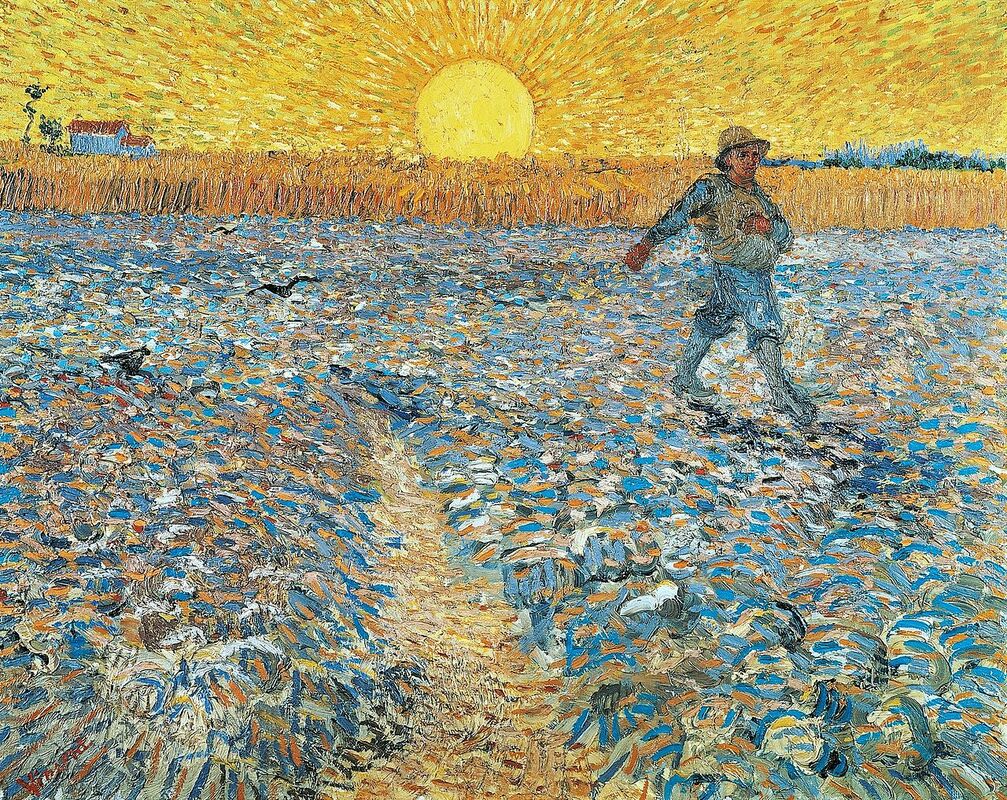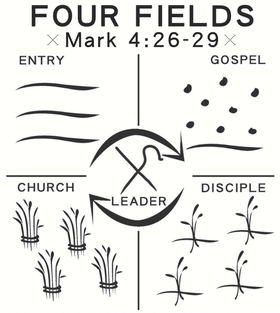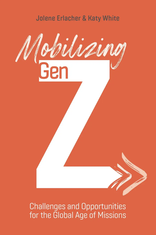These are the types of people who you probably know. One of the challenges of sharing the gospel and making disciples is that the people who the Lord brings into our lives are from vastly different backgrounds. These differences create a need for discernment and understanding as we build relationship and communicate with each of them. A conversation that goes well with one might implode into tension with another. It is these differences that create vastly different kinds and degrees of challenge for communicating the truth of the Gospel. There are always barriers between us and the people we wish to reach. Those barriers could be simple or complex. Culture, language, worldview, religious background, and personal experiences are all part of the mix of barriers that can challenge our ability to share the gospel. Missiologist Ralph Winter created a tool that helps describe these difference. It’s not a diagnostic tool to use on our friends or the new immigrant down the street but it does help us understand why our invitation to come to our church may be falling on deaf ears. The tool is called the E-Scale. In Winter’s own words: “The E-Scale helps compare the cultural distances that Christians need to move in order to communicate the gospel with others. E0 refers to evangelism of church-going Christians. E1 extends to the very same culture through one barrier, that of “church culture.” E2 evangelism presses into a close, but still different, culture. E3 evangelism pushes to very different cultures.” (read the original article here) E0 - The people who are within the church walls. They may be backslidden and asleep but they are in church on a somewhat regular basis. They may be there because mom and dad drag them there each week. Regardless, they have a basic understanding of church culture and church language and have a mostly Christian worldview. E1 - Those who have not ever entered the church but are part of the greater culture of the community or country where the church resides. These are the people who you work with and live by. They grew up watching the things you watched on TV, eating the foods you eat, reading the books in school that you read. They just don’t go to church and outside of an occasional funeral or wedding, never have. Church culture is mostly foreign to them. E2 - Those who come from similar but different cultures. While there are some cultural similarities, significant barriers begin to emerge. They may speak another language. They may have grown up with significant worldview differences. They may be from a different religion. Church culture is foreign to them. E3 - Those who come from cultures that are almost completely different. Where someone who is E2 may have one or two barriers, E3 represents the people where barriers are found in every major area of life: language, culture, worldview, religious background, etc. Church culture is utterly foreign to them and may be offensive. It must be noted that this is not a grading scale to be used in an us versus them them sort of way. It is a tool for anyone who wants to go and make disciples. An atheist from New York would be an E1 for me but would probably be an E3 for a missionary from China. It must also be noted that our E0 church culture is not what we should be trying to invite people into. We should invite them into a relationship with Jesus and then help them to form their own church culture, appropriate for their language and cultural realities. If the E-Scale does anything for you, I hope it will help you see why inviting your friends to come to your church is not necessarily the best evangelistic method. Most people outside your church doors aren’t going to come to church. Author and missiologist J.D. Payne recently said, “The Spirit can do anything. But unless another awakening occurs, I believe 25% is close to the maximum amount of the United States population that will be reached by our longstanding pastoral approaches to engagement.” The default of the last few decades in the North American church has been the invite. “Wanna come visit my church?” God can and will use this. We all know someone who came for a visit and met Jesus. But a far greater number of people won’t come. And they aren’t rejecting Jesus. They’re rejecting an idea they have about what church is - an idea that may or may not be based in reality because for most, they’ve never been in a church. Traditional approaches to outreach and disciple making become increasingly less helpful as the people with whom we are trying to use them have no church background. We need a new approach. And really we need to go back to an old approach, the original approach of Jesus. Go. Go and make disciples. Go into your neighbor's home. Go to the Muslim owned store down the street. Go and ask questions and learn about their story, their language and their culture. Go and pray and ask the Lord to prepare you to share his truth with the people you meet out in the harvest.
1 Comment
He also said, “This is what the kingdom of God is like. A man scatters seed on the ground. Night and day, whether he sleeps or gets up, the seed sprouts and grows, though he does not know how. All by itself the soil produces grain—first the stalk, then the head, then the full kernel in the head. As soon as the grain is ripe, he puts the sickle to it, because the harvest has come.” Throughout the gospels, Jesus presents principles for ministry through parables. These principles are then modeled by Jesus and applied in his assignments for the disciples. This particular parable includes a number of important principles for discipleship and has been an influential part of shaping the Everywhere to Everywhere training weekend event. Nathan and Kari Shank, long term workers and movement catalysts in India, have unpacked the parable of the growing seed in their training manual Four Fields of Kingdom Growth. [Download the manual for free HERE] The Five Parts of the Four Fields In Four Fields of Kingdom Growth, Shank points out that in the parable of the growing seed there are four contexts or fields. There is also a fifth element that is important in every movement of God. He offers a key question for each that focus both our kingdom work strategy and our training of new believers.
Field #4 - The Harvested Field - Eventually a season of harvest comes and the farmer is there to cut and bundle the harvest. Key Question: How do I form a new believers into groups or churches? Leader Multiplication - Generational Multiplication Potential - Out of the harvest comes both fruit for this year and seed for the coming growing season. Key Question: How do I develop and multiply a movement leaders who are raising up leaders? Jesus says that this is what the kingdom of God is like. It seems then that the parable of the growing seed could be a helpful framework around which to build a life of discipleship and ministry. It is the framework that has shaped much of the training we do at Everywhere to Everywhere events across the Midwest. And within it are principles that have been observed in every movement of kingdom expansion throughout history. Every disciple of Jesus should be trained and able to identify and understand how to enter the fields of lostness in their context, whether that be a Muslim village in Central Asia or their suburban neighborhood in Denver or Wichita. Every disciple of Jesus should be trained and able to proclaim the good news of the gospel with anyone, anywhere and anytime. Every disciple of Jesus should be trained and able to disciple new believers into a mature, healthy and growing relationship with Jesus and into the lifestyle of disciple making. And every disciple of Jesus should be trained and able to gather believers together as the body of Christ. The final element, leadership multiplication, is an important part of healthy discipleship and kingdom growth. The Apostle Paul always had two to three disciples with him who he was training up and releasing into ministry. Without the multiplication of leadership, the making of disciples will always come to a bottleneck. But as young disciples take what they have learned and pass it on to other disciples who will pass it on to others (2 Timothy 2:2), the kingdom will expand, our churches will grow and great commission discipleship will be a reality. This is exactly what we see in this parable, in the workings of Jesus and in the unfolding story of the the growth of the early church in the book of Acts. This is what we see in the the great movements of kingdom expansion throughout history. And this is what we see happening in the kingdom movements spreading across countries all around the world today. The Kingdom parables serve as a framework for understanding Jesus’ kingdom agenda across the gospel accounts. Jesus’ kingdom agenda serves as a working job description for both his disciples and our lives and ministries.” The four fields framework also creates a helpful rubric against which we can assess our own discipleship journey. It is a bit of a diagnostic tool which can help us see the places where we need more discipleship and training so that we can become the kind of kingdom agents that Jesus has called us to be. Just as he was sent, he is sending us into a lost and broken world to be his ambassadors (2 Cor. 5:20) and witnesses (Acts 1:8). Your Assignment Work through the following questions to help you understand where you might need additional training in order to step into your role as an ambassador and witness.
If you answered “no” to any of these questions or just felt unsure of whether you understand what or how to step into these kingdom assignments, find your pastor or a trusted mentor and ask them to help you get equipped. Check out the great training opportunities at the No Place Left website. However you respond, do something! Amidst this need to learn to do the work of the kingdom, we must remember that applying the principles of this parable to the ministry of making disciples and planting churches demands dependency on the Holy Spirit. It is the work of the Holy Spirit - the unknown doer in the parable - that causes the seed to sprout and to grow. As Christ’s disciples, there is a path laid out in the parable for how we can join in the work of the Spirit, but it is the Spirit that brings the growth. This was the understanding of Paul, who in 1 Corinthians 3:6 says, “I planted, Apollos watered but it was God who made it grow.” There are things that Paul and Apollos need to do and to train others to do, but spiritual fruit is always because of the power of God. My hope is that this parable will help you discover some of the places where you need more training or encouragement to become those who go and make disciples. Did you find this article helpful? Share it with a friend. In John 4, Jesus and his disciples were walking toward Galilee and were passing through Samaria. Tired from the journey, Jesus sat down by a well while his disciples scooted off to a nearby town to pick up some food. A Samaritan woman came to the well to draw water and Jesus spoke to her saying, “Will you give me a drink?”
There is all kinds of background and context to this exchange but in the course of the conversation between Jesus and this woman, she comes to realize that Jesus is someone very special, the long awaited Messiah. Once she realizes this, she leaves her water jug where it is, hurries back to her town and says to the people there, “Come, see a man who told me everything I did. Could he be the Messiah?” And the people respond. They come out to the well to meet Jesus for themselves where they eventually are lead to say, “We no longer believe just because of what you said; now we have heard for ourselves, and we know that this man really is the Savior of the world.” Making disciples begins with telling others about the good news of Jesus; the gospel. As we train people to make disciples, we find it helpful to answer a few simple questions to help people get started. This story helps us answer the question of who. Who should we share with? Who did the Samaritan woman share with? She went back to her town and shared with the people who knew her and by whom she was known. There is a relationship already established. And this is the place where we are all called to start making disciples. In Acts 17, the Apostle Paul is speaking at the Areopagus in Athens and he says, “From one man he made all the nations, that they should inhabit the whole earth; and he marked out their appointed times in history and the boundaries of their lands.” Have you ever thought that you are where you are, that you have the neighbors and co-workers that you do because God appointed you to be their neighbor or co-worker or friend right where you are? Paul continues by telling us why this is so: “God did this so that they would seek him and perhaps reach out for him and find him, though he is not far from any one of us.” Like the Samaritan woman, we have neighbors, friends and acquaintances who need to hear about the the good news of the Kingdom of God. And it’s no mistake that you are in their lives! God wants to use you to introduce them to Himself. Action Step Our lives are busy! Too often we get going through our days and weeks and, without some intentional effort, we easily miss the opportunities that God is putting before us. I too often find myself with my head down and it’s go, go, go. At our E2E events one of the training strategies we use is to have everyone take five minutes to pray about their life and think about the people in their life. We then have them make a list on a note card of everyone they can think of who they think is far from God. I’d like to challenge you to do this activity right now for yourself. Here are the four steps:
If you can do this; if you can begin to pray daily, I can almost guarantee that God will begin using you. You’ll find your friends suddenly asking questions about God. You’ll find that you are more readily transitioning to spiritual conversations and that you conversations are more fruitful than you would have imagined. God delights to answer these kinds of prayers for our lost friends and family members. And then they won't believe just because of what we have said, but will believe because they have met the Lord Jesus! What is it that has shaped the way you think about the world around you? What is shaping your worldview right now? I often say that we are all, always being discipled by something. We don't have a choice. The things we listen to, watch and read are shaping us. They are shaping how we think, forming our character and driving our interests. It is a reality. If we go to church for an hour and a half each week and then spend two hours every day watching Oprah or listening to Rush Limbaugh, guess what? Our thinking, character and interests will look a lot like Oprah or Rush. We don't have a choice. That's just what happens. The choice we do have is in the content of what we listen to, watch or read. We are in control of those choices. Our Multiply team was reflecting today on the desires of our heart. It was during this time that I began to think back over my life and the things that shaped some of my strongest desires. One book in particular came to the forefront of my mind. I read it first in college and it began to shape my thinking in powerful ways. It was the missionary biography Through Gates of Splendor by Elizabeth Elliot. There are others as well and with today's post I want to share with you 7 missionary biographies that I think will fuel your missions fire. They certainly have for me! You'll probably be able to find most of these in a church library near you, but if not, you can purchase them from Amazon at the links given.
I in no means intend to say that these are the seven best missionary biographies that are out there, but they are seven that get me excited and they are stories that will both inspire you and help to shape your heart for the nations. I hope you will find time to read them all in the next year!
Perhaps you have a favorite missionary biography - if so, please share it in the comments below. |
The E2E Community
Categories
All
Good Books
Archives
April 2024
|
Proudly powered by Weebly

